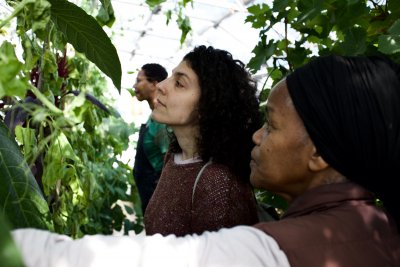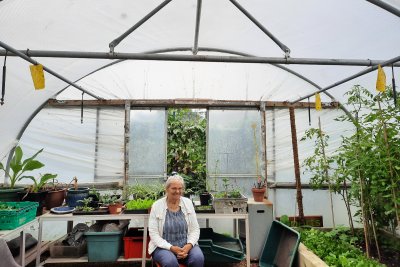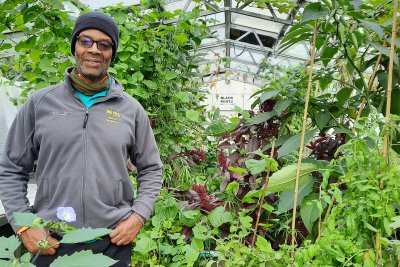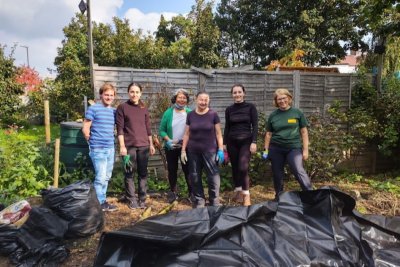Sustain • London Food Link • Articles
People Powered Food
In celebration of this year's Good to Grow Day, we're sharing another article, fresh from our brand new Jellied Eel print mag: People Powered Food. Read on, as Mayya Husseini, part of the Capital Growth Team, shines a light on three gardens reaping the benefits of their people power.

In autumn 2021, Capital Growth launched our Spotlight Gardens programme in order to showcase the ways food growing gardens help address the climate and nature emergency and build up community resilience.
When you think of green spaces in London, you probably imagine its leafy parks, providing pockets of peace in between the hustle and bustle. Do you think of food growing gardens as part of that greenness, though? With spring around the corner, they are gearing up for a bountiful season, and this means stirring in the key ingredient - the people.
Food growing spaces in and around London are as beautifully diverse as the people who live here. Thanks to this rich cultural mix of passionate people bringing their different skills and life experiences to care for these spaces, you can find small scale growing of the likes of white maize, ginger, kiwis, chayote and more.
Calthorpe Community Garden
This hidden green oasis in Kings Cross might not be here today if it weren’t for the local people who stepped up to save the site in the early 1980s. Annika Miller Jones spearheaded the grassroots movement to advocate for the site to be transformed into a green space that the local community needed. Fast forward 40 years and this site still has people at the heart of all its activities, whether they’re from the Bengali community managing the women-led allotments growing their native crops, or a HIV support group coming in for a horticultural therapy session run with charity Positively UK. Keeping the garden running smoothly is Mila Campoy, who makes a point of making everyone feel welcome from the second they step foot in the garden. “It reminds me of when someone arrives early to a barbeque and nothing is ready yet so you tell them to go grab a drink. By the end of the day, everyone is happy and mingling together” she shares.

Black Rootz
Wolves Lane Horticultural Centre in Wood Green is where you’ll find one of the first Black-led food growing enterprises in the UK. Springing out of the African diaspora-led Ubele Initiative in 2019, it brings together people from different generations to share knowledge and learn how to grow food commercially. It’s coordinated by Paulette Henry, who brings her experience of growing cultural heritage foods to the project, alongside Pauline Shakespeare from Rootz Into Food Growing - a collaboration between Ubele, OrganicLea, Black Rootz and Land In Our Names (LION). Collectively, they educate the community on the benefits of food growing while working with Black and People of Colour growers to redress the inequalities within food growing today. Enthusiastic volunteer, James Simpson, is testimony to the Black Rootz vision as for him, watching food grow and tending to the plants are continuous lessons in patience. He says: “caring for plants is actually caring for ourselves and I find the whole process very therapeutic.”

Mitcham Community Orchard and Gardens
The seeds for a community orchard on this previously derelict site were first planted back in 2010, when local environmental charity, Sustainable Merton, was approached by the council’s head of open spaces following concerns about fly tipping. Over the next two years, people began planting an orchard of fruit trees and bushes, adding wildlife-friendly flowers, ponds and hedging. There was a wealth of local know-how and ideas and with many helping hands and relentless volunteer days including regulars Genevieve and Gizela, the vision became a reality. More recently, Ellie Smallshaw joined to help manage the site and support volunteers, making for perfect social glue to keep this fruitful resource thriving.

Whether promoting pollinators, creating shade, improving water uptake to counteract flooding, or capturing carbon through the simple act of growing food, the people giving time, effort and love to these spaces are actively helping to tackle climate change. It’s increasingly clear these spaces are part of the city’s survival - our own survival – and need our protection.
Take part in this year's Good to Grow Day from 22 - 25 April, an opportunity for edible gardens to celebrate and prepare for the new growing season!
Published Wednesday 6 April 2022
London Food Link: London Food Link brings together community food enterprises and projects that are working to make good food accessible to everyone in London to help create a healthy, sustainable and ethical food system for all.